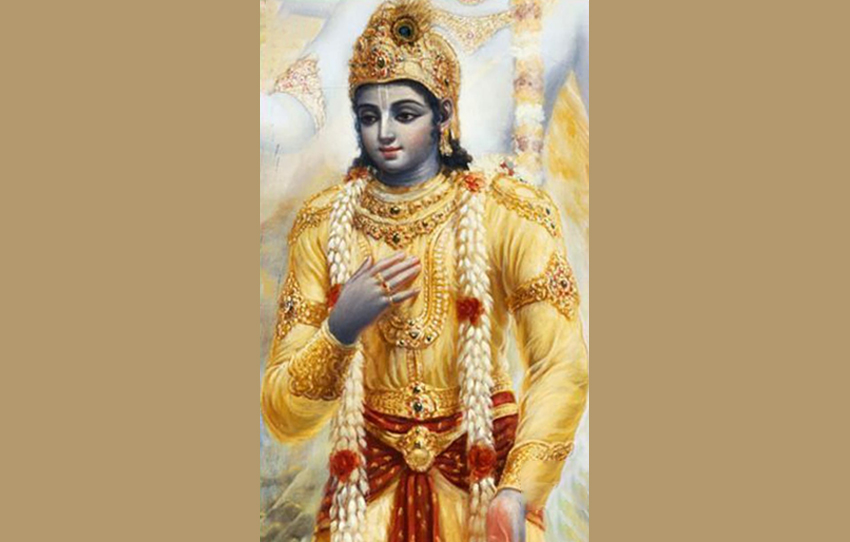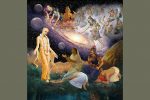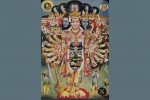NAME 33
He is the supporter of the universe. Kṛṣṇa says (Bhagavad Gita IX.18), “I am the supreme goal, the supporter, the Lord…” ŚvetāśvataraUpaniṣad (VI.6) uses the term, “viśvadhāma” to describe His support to the universe. Without His support, there can be neither creation nor any activity. The universe revolves around Him.
Kṛṣṇa says (Bhagavad Gita IX.18)
गतिर्भर्ताप्रभु: साक्षीनिवास: शरणंसुहृत् |
प्रभव: प्रलय: स्थानंनिधानंबीजमव्ययम् || 18||
gatirbhartāprabhuḥsākṣhīnivāsaḥśharaṇaṁsuhṛit
prabhavaḥpralayaḥsthānaṁnidhānaṁbījamavyayam
BG 9.18: I am the Supreme Goal of all living beings, and I am also their Sustainer, Master, Witness, Abode, Shelter, and Friend. I am the Origin, End, and Resting Place of creation; I am the Storehouse and Eternal Seed
Lord Krishna reveals that He is that which is attained as the ultimate goal of all existence. He is the sustainer, the nourisher, the maintainer and the controller. As paramatma the Supreme Soul within all living entities He is the witness and observer of all actions good and evil. He is the abode and resting place as He encompasses everything, everywhere. He is the refuge, the protector. He is the dear friend who always does what is beneficial. Lord Krishna is the basis and source of that which pre-eminently comes into existence known as all creation and He is also basis and destination of that which inevitably meets it end known as dissolution. He is the support of all by which they are able to exist. He is the repository by which they may remain latent and He is root seed in all things by which they are eternal for His spiritual seedis not destructible like seeds of rice and grains.
३३. ॐ भर्त्रे नमः।
33. Om Bhatraiy Namah
Bhartaa -The One who ‘Governs’ the entire living world. Governing includes protecting the world from all harms and serving it positively with progress and joy. One who does these to all.
INTERPRETATION GUIDED BY SANT VANI (WORDS OF SAINTS)
Bharta
The sustainer of the universe.
To sustain a job, a family, one’s body-mind-sense-complex is to keep it going in good condition.
It takes a lot of knowledge, skills, perseverance and effort. And we are talking only about one person and his/her family. The one who sustains the entire universe is Bharta. He establishes dharma, sustains dharma, in the form of the order that exists, the order in the form of what is right and wrong in this moment. The Lord is not sitting somewhere and pulling the strings. The Lord is manifest as the order – the many principles – physical, physiological, biological, psychological principles of the universe. So, the Lord is dharmasyabhartā. The word “dharma” has multiple meanings depending on the context in which it is used. These include: duty (svadharma), nature of a thing, action (karma), right, justice, religious merit (punya), Dharma has no equivalent in English and hence we go with the word, by understanding it further.
Dharma has the Sanskrit root dhri, which means “that which upholds” or “that without which nothing can stand” or “that which maintains the stability and harmony of the universe.” Dharma
encompasses the natural, innate behaviour of things, duty, law, ethics, virtue, etc. Every entity in the cosmos has its particular dharma — from the electron, which has the dharma to move in a certain manner, to the clouds, galaxies, plants, insects, and of course, human beings.
Dharma is not present in some great grand book nor is it a list of dos and don’ts. The beauty is that in human beings, the Lord manifests as the understanding of dharma – the right thing to do in a given situation which is helpful and non harming to self and others. A 7 year old child playing with his toys when there are other children nearby who don’t have toys, a couple who are having frequent fights, an employee fed up with his job, all of them irrespective of their age and stage in life, know what is to be done that is appropriate in their situation. Still because people are inhibited by their desires and aversions, they can’t seem to do what is right. Duryodhana, in the Mahābhārta makes an insightful statement reflecting his condition –
‘I know what is dharma, but I can’t follow it. I know what is adharma, but I cannot refrain from it. There is something that pushes me to what is not right and I do accordingly. ‘
The joy that one gets out of reaching out to another person in distress, sharing even a smile with another, staying up late to look after one’s ailing child, completing things on time, finishing the much postponed laundry is not the kind of joy that one gets out of pursuing wealth or even pleasure. This is the joy of dharma. To be meditating on this name in true essence is to stay centred and perform actions that are appropriate in the present moment bringing value to the lifes around you and serving the one who sustains all.
When there is an imbalance, a disturbance to the order of the Lord in the form of principles that sustain the universe, then dharma is suppressed by false beliefs and practices brought on by misguided leadership. Ishvara restores the balance again by taking the form of an avatāra if required and hence, He is the Bhartā.
Further, He sustains the entire prapanca, universe as the adhiṣṭhāna, by giving it existence and consciousness.



